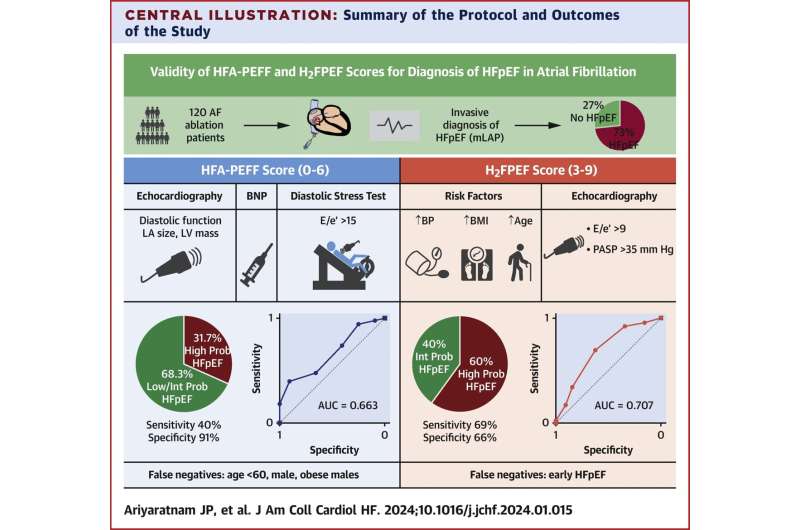This article has been reviewed according to Science X's editorial process and policies. Editors have highlighted the following attributes while ensuring the content's credibility:
fact-checked
trusted source
proofread
Non-invasive screening tools may miss heart failure for certain patients and should be used with caution, warns study

Existing non-invasive screening tools may miss heart failure among patients with atrial fibrillation (AF) and should be used with caution, according to recent research.
The warning follows a University of Adelaide study looking at the effectiveness of the internationally recommended screening tools for diagnosing a specific condition called heart failure with preserved ejection fraction in AF patients.
The results of the study, titled "Utility and Validity of the HFA-PEFF and H2FPEF Scores in Patients With Symptomatic Atrial Fibrillation," have been published in the journal JACC: Heart Failure.
"This is the first study to look at whether two of these non-invasive scoring systems can be used to detect this condition in AF patients," said first author Dr. Jonathan Ariyaratnam—a Post-Doctoral Fellow with the Center for Heart Rhythm Disorders at the University of Adelaide.
"Diagnosing this type of heart failure in AF patients is particularly challenging because the symptoms of both conditions are very similar and can be overlooked to the detriment of the patient's long-term treatment."
AF causes the heart to beat irregularly and faster than normal, increasing the risk of blood clots in the heart. It can lead to life-threatening conditions such as stroke and heart failure, the latter of which affects 64 million people worldwide.
A previous study by the Center for Heart Rhythm Disorders used an invasive testing protocol to reveal that almost 75% of patients with symptomatic AF had features of heart failure.
A total of 120 AF patients who underwent ablation procedures took part in this latest clinical trial, which was carried out at the Center for Heart Rhythm Disorders between 2020 and 2022.
The first screening tool was the HFA-PEFF score, which uses a diagnostic algorithm based on resting echocardiogram, stress tests and blood markers to estimate the likelihood of a patient having heart failure.
The second screening tool was H2FPEF which uses cardiovascular risk factors and resting echocardiographic parameters to predict the probability of the patient having heart failure. Both methods were compared with the current gold standard diagnostic tool, which is more invasive, requiring direct access to the heart using specialized catheters.
"We discovered that the first screening tool was less likely to detect heart failure in younger, obese men with AF. The second method was more sensitive but AF patients who were showing early signs of heart failure were missed," said senior author Dr. Adrian Elliott from the University of Adelaide's Center for Heart Rhythm Disorders and the Royal Adelaide Hospital.
"While the less invasive methods of testing were able to diagnose heart failure in AF patients with moderate accuracy, invasive testing is still needed to confirm results and remains the best diagnostic tool. Based on this, I would recommend these scoring systems be used with caution in AF patients," said senior co-author, the University of Adelaide's Professor Prash Sanders, Director of the Center for Heart Rhythm Disorders and Director of Cardiac Electrophysiology and Pacing at the Royal Adelaide Hospital
Heart failure is a growing issue. Its rapid rise is attributed to the aging population and increasing rates of high blood pressure, diabetes and obesity—all risk factors for the condition.
More information: Jonathan P. Ariyaratnam et al, Utility and Validity of the HFA-PEFF and H2FPEF Scores in Patients With Symptomatic Atrial Fibrillation, JACC: Heart Failure (2024). DOI: 10.1016/j.jchf.2024.01.015




















